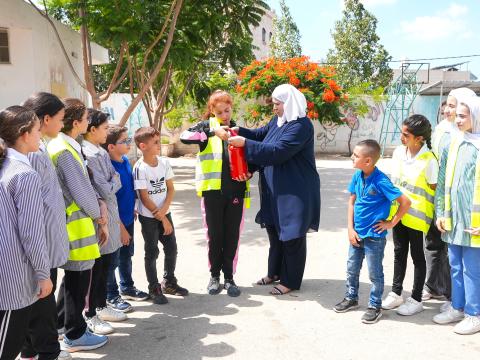Strengthening WASH and emergency preparedness in schools in the West Bank when children need it the most

World Vision International Jerusalem - West Bank - Gaza in partnership with the Palestinian Hydrology Group (PHG), successfully completed the project “Building Resilience and Ensuring Protective Hygiene in WASH and Disaster Risk Reduction Systems at Schools”in the West Bank. This 36-month project, funded by the German Federal Ministry for Economic Cooperation and Development (BMZ) with a budget of two million Euros (US$ 2.17M), has allowed to improve access to quality Water, Sanitation and Hygiene (WASH) facilities for students, to promote good hygiene practices, and to enhance disaster preparedness among targeted schools’ health committees, students and schools. The project supported 50 schools in Area C of the West Bank across the governorates of Hebron, Bethlehem, Salfit, Nablus, Jericho, Jenin, and Tubas, benefiting to close to 13,500 students aged between 6 and 16 years, and around 1,000 teachers.
A survey conducted at the beginning of the project showed that a third of the students were avoiding using the toilets or drinking from the faucets at their schools due to maintenance and cleanliness issues. This situation was having a major impact on the hygiene and health of the students, while also encouraging absenteeism, especially among girls. To address this issue, hundreds of sanitary units were rehabilitated through the project while over 200 taps and 62 water tanks were installed. A full range of additional interventions at multiple levels were implemented to complement the rehabilitation and ensure a continuous and sustained access to clean WASH facilities beyond the duration of the project. As a result, by the end of the project, 73% of the school children reported that their school was equipped with adequate WASH infrastructure (versus 0% by the start of the project).
The project also aimed to improve the personal hygiene of participating students and teachers through the provision of training to more than 900 students and the distribution of thousands of cleaning and disinfection guidelines, personal hygiene kits and bins. As a result, by the end of the project, 84% of the students reported an improvement of their personal hygiene practices.
One of the key objectives of the project was to increase preparedness and to strengthen capacity for emergency response. This objective was especially relevant as the West Bank has seen an escalation of violence over the last 10 months leading to hundreds of incidents of violence in or around schools. The project mapped the common risks and hazards affecting the selected schools and their areas, and based on the results, it also assessed and updated the school’s safety plans. The project combined several approaches to reach this objective from capacity development of the relevant staff of the Ministry of Education to the equipment of schools and the implementation of innovative awareness raising campaigns through theatre, media, social media and educational interactive games. As a result, 84% of students reported an increased knowledge on how to respond to an emergency while 73% of them reported increased skills on how to respond to an emergency. Overall, 88% of the students showed an improved preparedness to disasters and emergencies.
The project also contributed to strengthen the capacities of the Palestinian Hydrology Group (PHG) while contributing to the implementation of the national strategy of Ministry of Education and to progress toward the achievements of the Sustainable Development Goals 3, 4 and 6.
A long teacher strike in 2022 and 2023, followed by a significant increase in violence after October 7 2023 and the adoption of mandatory virtual learning for long periods of time significantly complicated the implementation of the project. However, adaptation and flexibility allowed local communities and implementing partners to achieve eight out of the nine project’s targets. Equipping the schools’ laboratories and Directorates of Education with safety tools demonstrates the project’s flexibility. The significant achievements will contribute to increase the resilience of the supported students, teachers and schools as they continue to face significant challenges in the current context.
Notes for the editors
Contact
Saher Khoury, Project Manager, World Vision International Jerusalem – West Bank – Gaza
Phone: +972 59 288 8102
Email: saher_khoury@wvi.org
About World Vision International
World Vision International is a Christian relief, development and advocacy organisation dedicated to working with children, families and communities to overcome poverty and injustice. The organisation started to work in the West Bank and Gaza in 1975.
Since then, World Vision JWG has developed one of the largest community-based presence of any organisation operating in the West Bank with 85 dedicated staff and a total annual budget of $11 million USD. In 2023, our programming on education, early childhood development, child protection and child resilience benefited directly more than 136,000 people, including 95,000 children in 150 villages in the West Bank.